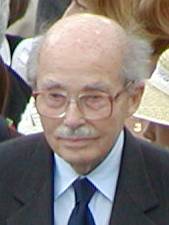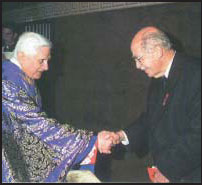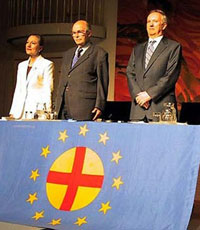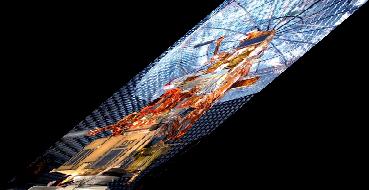Christian Statesman
 Dr. Otto von Habsburg
Dr. Otto von Habsburg
- by Cathy Pearson
At 94, the "uncrowned emperor" and visionary architect of a reunified Europe carries on a thousand-year legacy of Catholic political leadership
The past and future of Europe have hovered as a haunting subtext beneath all the headlines of 2006. Even as the global encounter with the Islamic world has claimed center stage, the very specter of clashing Christian and Moslem civilizations brings the mind back to Europe -- a Europe seemingly in full flight from its Christian heritage just as it stands on the brink of achieving the peace and unity that had eluded it for so many centuries. Europe the cradle of Christendom, where Christianity has become politically incorrect. Europe that stopped Islamic invasions at Tours and Lepanto and Vienna, but where now in some of its countries "Mohammed" is the single most popular name registered for newborn boys. Europe the 21st century's amnesiac lost child, bent on demographic suicide yet somehow still hearkening to its unique destiny as the heart of Christian civilization.

Dr. Otto von Habsburg
If the "problem of Europe" weighs heavily on the heart of this Bavarian pope, no one man better personifies a truly Catholic response to it than does Dr. Otto von Habsburg, heir of the last great Catholic monarchy and visionary architect of today's expanding European Union. His decades of public service in the political arena exemplify the best in Europe's Christian past and its hopes for a peaceful, united and still Christian future.
Born to a 700-year-old imperial dynasty, the present-day head of the House of Habsburg has, in his own way, taken up the same mantle of responsibility borne by the Austrian emperors, and the Holy Roman Emperors before them, without benefit of any of the office's perks or powers.
Probably most identified with Dr. von Habsburg is the staggering achievement of European unity in our lifetime after a century of warfare and Cold War polarization. No one has done more to bring about the new Europe, or to manifest it in his own person. A citizen of at least four nations, an orator who switches effortlessly between German, French, Hungarian and other languages, with descendants and extended family members in more countries than one could count, his allegiance goes beyond any national boundary. He himself has recalled as an epiphany the day he first spontaneously answered the nationality question with "I am a European."
The man who would become "Mr. Europe" began life as the son and heir of the last emperor-king of the Austro-Hungarian Empire -- the recently beatified Karl of the House of Austria -- who had inherited the thrones of the Dual Monarchy as World War I raged. Crown-prince Otto as a four-year-old cut a memorable figure in plumed hat and court attire when Emperor Karl was crowned as King of Hungary -- the last formal coronation and anointing of a Catholic monarch, for which Hungary has just celebrated the 90th anniversary this December 30th (coverage in our February issue).
But Dr. von Habsburg's achievements are not the gift of privilege but the hard-won fruit of struggle and perseverance against the direst circumstances. Barely two years after the coronation, the tragedy of World War I -- which Emperor Karl struggled desperately but unsuccessfully to stop -- brought on the dismemberment of the Austro-Hungarian Empire and the fall of its monarchy. Stripped of all power, robbed of public honor by a malicious campaign of lies, and with even their private possessions confiscated, the imperial family had to look on, penniless and powerless from their forced exile in Switzerland, as revolutions, anarchy and economic collapse ravaged their formerly thriving lands. Attempting twice to regain his Hungarian throne -- urged on by Hungarians and by Pope Benedict XV but betrayed by treachery -- Emperor Karl and Empress Zita were captured and sent to a more distant exile on the island of Madeira. Otto was not yet ten years old when his father died there in 1922.
Forbidden to return to their homeland, lacking any means of support, the family first took refuge in Spain and later moved to Belgium, depending on the kindness of others and struggling to earn their own way. At the age of 12, Otto took a job on a Spanish fishing boat to help make ends meet. Literally homeless refugees, Empress Zita and their eight children moved from country to country, living a life of great austerity, always with the goal of providing Otto the education he would need as a future public servant. Rewarding his family's sacrifices, Otto excelled as a student, earning a PhD with highest honors from the Catholic University of Louvain, Belgium.
Even more remarkable than this triumph over adversity was the forgiving attitude and selfless dedication with which he took up a life of service. Equipped by his formal education and the priceless legacy of his early home-schooling in the arts of government, Archduke Otto would indeed embark on a career of public service to the nations of the former empire -- and the broader Europe of which they were a part -- that spanned over seven decades, capped by a twenty-year career in the European Parliament. Still going strong at 94, equally at home in the halls of academia and government, Dr. von Habsburg is an author of books (including a history of his ancestor Emperor Charles V) and countless learned papers, a sought-after speaker, a man of prodigious work habits and seemingly inexhaustible energy (his office door warns, "If you have nothing to do, please don't do it here").
In numerous ways the long and distinguished career of this globally recognized Catholic layman could have made him a potential Person of the Year in more years than Inside the Vatican has been published. But it is for one unique contribution that we now honor Dr. Otto von Habsburg: the ideal of selfless political leadership.
A Mandate to Serve
While still in office and then in exile, Emperor Karl had personally taught Otto as his successor -- both by word and example -- that the office of a ruler is one of holy service and selfless sacrifice for the good of the peoples entrusted to him. The crown and its responsibilities had been given by God and could not honorably be laid down. No longer able to serve his peoples politically through just laws and humane policies, Emperor Karl redoubled his spiritual works of mercy on their behalf, praying constantly for their temporal and eternal welfare, forgiving all his enemies, offering to God all he had already suffered, and -- after freely accepting an invitation he discerned from God in prayer to give even his own life -- offered his painful last illness and saintly death at 34 "for the salvation of my people," "for the good of the Church," and "so my people can come together again."
Pope John Paul II, in beatifying Emperor Karl, called him a model for Christian statesmen of today, especially in Europe. Otto himself shows how that ideal is as relevant to a democratic age as it was in the days of monarchy. And his faithful witness to that role began long before he became a public officeholder. Technically, the imperial mantle fell on his shoulders the moment his father passed to eternity. To a remarkable extent, the young archduke, on reaching his majority in 1930, simply took up and began exercising that responsibility as if he had the actual office–without seeking thanks or reward, without benefit of title, power or resources.
Working from exile for the good of the homeland he was forbidden to enter, he supported those Austrians who tried to prevent the country's annexation to Nazi Germany. When war came, he expended all his energies persuading President Roosevelt and America's soon-victorious allies to regard Austria as a victim of Nazism rather than its accomplice. He worked with the Allies to develop post-war plans for Austria and other lands of the former empire (though, sadly, these were later sacrificed to Stalin's demands). After the war, he worked zealously to raise relief funds for Austria and the other imperial nations, no matter that he was still unwelcome there.
The same moral high ground marked Dr. von Habsburg's later political career. Returning to Europe after the war, still forbidden to enter Austria, Archduke Otto made his home in nearby Bavaria, where he and his wife, Regina von Sachsen-Meiningen, raised seven children. Always a practicing Catholic and exemplary family man, he built a political career which, after half a century in public scrutiny, could boast a spotless record of unquestioned integrity and tireless hard work.
A Vision for Europe
An early pioneer in the Pan-Europa movement, which he would one day head, he did as much as any man alive to lay the groundwork for the European Union. When vision became reality, he served for two decades (1979-1999) in the European Parliament as an elected member from Bavaria. Far from narrowing his scope of responsibility from the whole empire to Germany as his adopted country, he broadened it to include all of Europe. While working on behalf of the emerging European Community in the west, he continued through the height of the Cold War to do what he could for the nations trapped in the Soviet Bloc. He stood by the beleaguered Cardinal Mindszenty before and after the Hungarian Uprising in 1956. He encouraged the first glints of light as the Soviet Empire began to falter.
In 1989, Dr. von Habsburg helped persuade the Hungarian government to open its border to East Germany, through which a flood of East Germans found their way to the West. In August of that year, the "Pan-European Picnic" that he and his Pan-Europa Union sponsored at the Austria-Hungary border became an opening chink in the soon-to-fall iron curtain. Since the end of the Cold War, Dr. von Habsburg -- finally welcome in all the nations he sought to serve -- has traveled widely in Eastern Europe assisting those lands in their transition to democracy. He worked for the independence of the Baltic States from the Soviet Union. During the tragic Balkan conflicts, he worked tirelessly on behalf of peace and relief for the victims. Though retired at last from his career in Parliament, Otto von Habsburg remains on the cutting edge of European unification, working to hasten the full integration of Eastern European nations into the European Union.
The unity of Europe -- first Western Europe and now all of Europe -- represents a staggering turnaround that Archduke Otto must see as a sweet vindication in many ways. The guns of war that sounded in his earliest memories, and continued their carnage in waves through the twentieth century, have given way at last to the peace his father sought. The wall that so long divided east from west has fallen. The national boundaries that once stopped even his own feet from crossing into his homeland have given way to the European Union's free movement of people. Its common market and shared economic life have begun to reverse the artificial constraints that hobbled the growth of central Europe -- not just the straitjacket of Soviet Marxism but the carving up of prosperous economies into non-viable micro-units that was only one of the tragic results of the mismanaged 1918 peace. In the political sphere, the peoples of Europe are finally working out supra-national institutions that reconcile the age-old tug between the nationalism of peoples and the dream of a European super-state, the latter too often hijacked to the ambitions of a Napoleon, Hitler or Stalin.
In this towering achievement can be seen the triumph not only of the ideas of Count Richard Coudenhove-Kalergi and Otto's other fellow pioneers of the Pan-Europa movement, but also of the earlier Habsburg idea whose legacy he also bears. It is fitting that Otto von Habsburg -- a democratic politician and foe of all of the twentieth century's tyrants -- should be the standard-bearer in modern times for a dynasty that grew its lands by inter-marriage and fostered the idea of a united state that incorporates many nations and peoples while respecting their unique laws and customs. It is a different variation but somewhat similar in concept to the "nation of immigrants" that built a multicultural continental state on the other side of the Atlantic.
If Dr. von Habsburg has been at the heart of Europe's transformation into a multinational superpower -- with a multicultural base that has become as "in" today as balkanization into national enclaves was "in" 90 years ago -- he has also been ahead of his time in addressing the challenge of Europe's identity and survival in a larger world. Like Pope Benedict XVI, he is also on the cutting edge of today's topic du jour, European-Muslim relations. He has long emphasized the need to understand and reach out to Muslims, adding that he has read all the sacred books of Islam "and found much Christian wisdom there." The Habsburg Empire had combined an unmistakable Catholic identity with a policy of tolerance for all religious minorities. In the footsteps of his father Emperor Karl -- who was a military ally of Ottoman Turkey while also ardently championing the beatification of Fr. Marco d'Aviano (the capuchin who rallied the defense of Vienna against the Turks in 1683) -- Otto von Habsburg has cautioned fellow Europeans about unforeseen consequences of integrating Turkey into the European community, while also emphasizing the positive potential of Turkey's leadership in the Islamic world. He has also stressed the importance of reaching out to those societies for points of common culture and purpose. The very week Emperor Karl was beatified in Rome in October 2004, Dr. von Habsburg addressed an academic symposium there on the topic of an emerging Mediterranean civilization that includes both Christian Europe and Moslem nations on the African and Asian rim.
A Catholic in the Public Square
The role of religion in the public square is one of the great unfinished agenda items confronting Europe, as it is for all nations in today's secular world. Dr. Otto von Habsburg is a political leader whose identity as a Catholic is as unmistakable as his identity as a European. As a parliamentarian of Bavaria's Christian Social Union party, he stood squarely in the tradition of Catholic political activism fostered by Pope Leo XIII and bearing fruit in Europe's many Christian-identified parties. In the spirit of those movements, he has used his position to promote governmental policies that uphold moral standards, foster peace and cooperation among nations, and advance the social good of the people. But he also bears faithful witness in our time to an even older tradition -- the age-old Habsburg role as defender of Church and pope.
Respecting the autonomy of church and state, Dr. von Habsburg as a politician has steered clear of any involvement in Church politics and controversies, and even maintained a discreet distance while the Vatican pursued the beatification of his father, wanting to avoid even the appearance of political intrusion in ecclesiastical affairs. But like his ancestors, quietly and behind the scenes, he has been a loyal friend and stalwart defender of a century's succession of popes. He often met privately with Pope John Paul II (with whom he shared a special bond because the Pope's father had served as a military officer under Emperor Karl), and has continued to do so with Benedict XVI, whom he already knew from his many years in Catholic Bavaria.

Otto von Habsburg meets Pope Benedict XVI
A memorable incident captures Archduke Otto in the quintessentially Habsburg role as defender of the pope. When Pope John Paul II visited Strasbourg to address the European Parliament in 1988, he had barely begun to speak when a parliamentarian from Northern Ireland -- the anti-Catholic extremist Rev. Ian Paisley -- jumped up shouting that John Paul was the anti-Christ, while unfurling a banner proclaiming the same message. In almost the same instant, Bavarian parliamentarian Otto von Habsburg was on his feet and down the aisle, grabbing the banner from Paisley's hand and, with several others, escorting him out of the chamber.
In today's world, it is usually not the person of the pope that is under direct attack, but the Christian faith itself. In Europe, Pope Benedict, like his predecessor, enjoys enormous respect, but the trend in public policies cuts to the core of Christian civilization. When Emperor Karl was in exile, representatives of the same Freemasonry that had engineered his downfall offered to engineer his re-instatement, if he would agree to give them control in just two areas -- the education of children and laws regarding marriage. Karl, of course, refused. And yet, the boldest Freemason of Karl's day would not have dared hope for the policy climate that prevails in the European Union today -- where nations contemplating membership are pressured to embrace abortion, where a distinguished Italian public servant was barred from European office for daring to state his adherence to longstanding Catholic doctrine, and where redefining marriage to include same-sex relationships is the latest trend.
At the time of Emperor Karl's beatification in Rome in 2004, when former Soviet Bloc nations had begun entering the European Union and passage of the new European Constitution seemed imminent, many people were hailing the reunification of Europe as a vindication of Blessed Karl, who had said shortly before his death, "I must suffer so much so that my people can come together again." But one could not help but think with sadness about the other part of his sacrificial intention -- the good of the Church and the salvation of his people. Are we moving forward, or falling backward? Will Europe ever again hope to see a truly Christian, Catholic civilization?
And so we asked Archduke Otto, during those joyful October days, "what about the other half, ‘for the good of the Church'?" He answered with great energy and conviction, eyes sparkling, "Oh, it will come -- it will come!" He added there are places where indications of it can be seen already.
Dr. von Habsburg is nothing if not an optimist. But then, few people are as entitled to his optimism as he is. The young heir to the thrones of Austria and Hungary, who even in exile was on Hitler's hunt-and-kill list, has lived long enough to see the "thousand-year Reich" consigned to the ash-heap of history. He has lived long enough to see the iron grip of Soviet Marxism on Eastern Europe -- something Western policy analysts as late as the 1980's expected to endure for generations -- dissolve into a bad memory with scarcely a shot fired. He has lived long enough to see the nations of the former empire, forcibly broken up into economically and politically marginalized units, come together peacefully as part of a European superpower which he did much to bring into being. The head of the House of Habsburg, who for decades was not permitted so much as to set foot in his native land, lived long enough to hear the Cardinal Archbishop of Vienna address him as "your imperial highness" at a Mass at the Stefansdom celebrating his 90th birthday. (Yes, without provoking a riot or government crisis!) Perhaps, then, it is not so unreasonable for him to foresee a vibrantly Christian future for a continent whose brave new government is today ashamed even to acknowledge its Christian past.
Europe has done very well for itself by following Otto von Habsburg's vision of a continent of free peoples united in their diversity. One might dare hope that they might follow his lead one step further, and find their highest common purpose in bringing their private and public lives under the gentle scepter of the crucified King. And one might dare pray that their leaders, conforming themselves to that King who came not to be served but to serve, might -- after the example of both Otto von Habsburg and his sainted father -- find their highest calling in selflessly serving their people as truly Christian statesmen.

Dr. von Habsburg with the flag of the Pan-Europa Union. The EU adopted it with one conspicuous change.
... link









